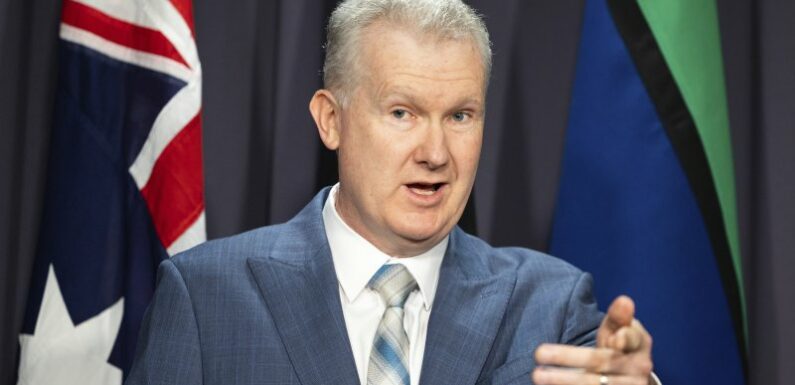
Giving Australia’s lowest earners the biggest pay boost in decades would not fuel a wage-price spiral, according to the federal government, which expects bosses to be bracing for a higher increase than last year.
Workplace Relations Minister Tony Burke said on Friday there was no evidence of wages being a driver of recent high inflation.
Workplace Relations Minister Tony Burke says there’s no evidence of wages being a driver of recent high inflation.Credit:Alex Ellinghausen
“We know that inflation is not driven by high wage growth in Australia because we don’t have high wage growth in Australia,” Burke said, noting wages overall increased 3.3 per cent in the December quarter despite last year’s 5.2 per cent minimum wage increase.
“In terms of the impact across the economy, the concept that somehow it would be a driver of inflation is not true.”
The government has recommended to the Fair Work Commission’s annual review of the minimum wage that the real wages of Australia’s low-paid workers do not go backwards, but businesses and some economists are concerned that a big increase could keep inflation above the Reserve Bank’s 2 to 3 per cent target band for longer.
The inflation rate fell to 6.8 per cent in February from a peak of 8.4 per cent in December, and the Reserve Bank has forecast quarterly inflation to ease to 6.7 per cent in the June quarter. If the commission were to lift the minimum wage in line with inflation, it would be the highest percentage increase in more than 30 years.
The government’s submission to Fair Work’s review, which sets the lowest allowable hourly rate every year, said signs of wage growth and easing inflation meant “the likelihood of a wage-price spiral remains low”.
“There are also risks associated with persistent or larger than expected declines in real wages for workers on minimum and award wages,” it said.
Stephen Koukoulas, who was a senior economic adviser to former prime minister Julia Gillard, said the government’s position was largely correct and the Reserve Bank would probably reduce its inflation forecast for the June quarter.
“That doesn’t mean there isn’t a link between wages and inflation. There is. It’s just a question of what is a justifiable, reasonable level of wages growth,” Koukoulas said, adding the minimum wage decision directly affected only a small part of the workforce.
About 180,000 Australians earn the minimum wage, but the benefits of a pay rise flow through to around 2.7 million workers on award wages.
While the government has stopped short of explicitly repeating Anthony Albanese’s call during last year’s election campaign for a minimum wage rise to match the rate of inflation, Burke said the prime minister’s previous stance remained consistent with Labor’s approach.
Speaking to ABC radio in Melbourne on Friday, Albanese said the government’s values had not changed.
“If the Fair Work Commission was to determine that people not go backwards, would I welcome that? Absolutely,” he said.
The government is heading towards a showdown with business, which wants a much lower increase. The Australian Chamber of Commerce and Industry has recommended a 3.5 per cent wage rise for the year ahead, half the rate being called for by the Australian Council of Trade Unions.
ACCI head Andrew McKellar said a 3.5 per cent rise, which would amount to a real wage cut, was necessary to keep inflation under control, small businesses viable and people employed.
The government’s submission said given the current rate of inflation and last year’s 5.2 per cent wage rise when inflation was at 5.1 per cent, “it is likely that employers are expecting higher increases to the minimum wage and have considered and planned strategies to manage the anticipated large increase”.
But McKellar said many businesses in award-reliant sectors had experienced falling profitability and very tight margins.
“For many small businesses, there’s no more fat left on the bone,” he said.
“The only way they can afford an inflation-matching wage increase will be to raise prices, further stoking the inflationary fire.
“An arbitrary increase to minimum and award wages means inflation and interest rates will remain higher, for longer, which will erode the living standards of all Australians.”
The Fair Work Commission will rule on the minimum wage at the end of June.
Cut through the noise of federal politics with news, views and expert analysis from Jacqueline Maley. Subscribers can sign up to our weekly Inside Politics newsletter here.
Most Viewed in Politics
From our partners
Source: Read Full Article
